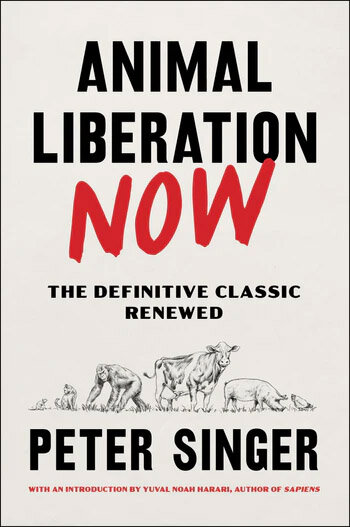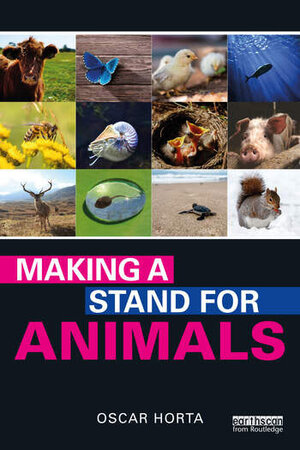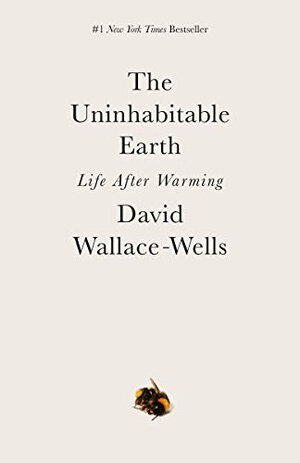Animal Liberation Now
In the 48 years that have passed since the publication of Peter Singer’s pioneering book, Animal Liberation, major advances have been made on the animal welfare front. For example, there are fashion designers who no longer use fur, cosmetics companies that no longer test their products on animals, and restaurant chains that are phasing out the use of eggs from caged hens. Vegetarian and vegan alternatives to animal-based food products are readily available in mainstream restaurants and supermarkets. There even are political parties that are dedicated to animal welfare, and in several countries, members of these parties have won seats in parliament.
But as Singer points out in his 2023 edition, Animal Liberation Now, “the struggle for animal liberation has made progress since 1975—but we are still failing to prevent atrocities on a vast scale.” Animals languish in laboratories and on factory farms, hidden away from the public.
Singer shares the details of brutal psychological experiments that were conducted on dogs, monkeys, and other animals. These experiments, which caused permanent damage to these nonhuman subjects, and which benefited neither humans nor animals, took place at research facilities that received funding from the U.S. National Institutes of Health (NIH). In other words, American taxpayers are helping to fund these brutal and redundant experiments. Singer also notes that “the U.S. Animal Welfare Act, which gives USDA authority to regulate research on animals, specifically excludes rats, mice, and birds—which make up the vast majority of animals used in experiments.”
In 1975, it was still common for milk, eggs, and meat to be derived from animals who were raised on family-owned farms, where they could graze outdoors in the fresh air and sunshine. These days, most family-owned farms have been replaced by factory farms, and as Singer points out, the deplorable and unsanitary conditions on factory farms pose health risks to animals and humans alike.
It’s a sobering reality that most animals who are part of the food industry suffer from the moment they are born to the moment they are slaughtered.
Singer details, with painstaking clarity, the suffering endured by the various kinds of factory-farmed animals who are raised to produce the meat, poultry, eggs, and dairy products that humans consume. It’s a sobering reality that most animals who are part of the food industry suffer from the moment they are born to the moment they are slaughtered. Animals raised for their milk or their eggs usually end up being killed when they are no longer producing sufficient milk or eggs to yield a profit.
Singer begins the book’s third chapter: “In August 2021, five veterinarians published an article in the Journal of the American Veterinary Medical Association that describes, in calm and precise language, and with charts and tables, how between April and June 2020, they planned and directed the killing of 243, 016 pigs....” These pigs were killed via heatstroke, under the direction of veterinarians—members of a profession that is commonly associated with healing animals, and not with torturing them to death. The pigs were not being slaughtered for their meat, but because the shuttering of the slaughterhouses due to the COVID-19 pandemic lead the proprietors of the factory farms to search for a quick way to depopulate their crowded facilities.
In the section of the book devoted to slaughter, Singer reminds the reader that sometimes the speed at which animals are moved along the killing line at the slaughterhouse prevents the animals from being stunned before they are killed. He also points out that it isn’t only warm-blooded animals who suffer when they are slaughtered. The way fish killed for human consumption die is especially cruel.
Speciesism—the presumption that humans are superior to animals—is at the root of the indifference to the mistreatment and killing of animals. And in a chapter entitled “Living Without Speciesism,” Singer provides a detailed guide to what he refers to as “effective altruism for animals.”
Speciesism—the presumption that humans are superior to animals—is at the root of the indifference to the mistreatment and killing of animals. And in a chapter entitled “Living Without Speciesism,” Singer provides a detailed guide to what he refers to as “effective altruism for animals.” Unlike some animal welfare advocates who urge omnivores to become vegans practically overnight, Singer acknowledges that some omnivores will take the first step by becoming what he refers to as “conscientious omnivores.” Conscientious omnivores still consume animal products, but they purchase animal-based products not derived from factory-farmed animals.
At the conclusion of the book, Singer shares several vegan recipes, such as goulash made with vegan sausages. This reviewer thinks these dishes can be enjoyed by anyone, including omnivores.
Singer points out that most children love animals. As vegan alternatives to animal-based products become more and more readily available and as humane alternatives to animal testing become more and more commonplace perhaps future generations of children will undo the harm caused by the culture of speciesism.
Regina Faighes is a data analyst at Candid.










Why animal welfare must be the next frontier for climate funders